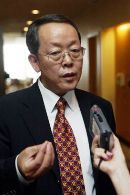China threatens to veto UN Darfur resolution over oil sanctions
UNITED NATIONS, Sep 17 (Bloomberg) — China will veto the U.S. draft resolution threatening to impose United Nations oil trading sanctions on Sudan for failure to end the humanitarian crisis in Darfur unless the warning is dropped, China’s UN envoy said.
 U.S. Ambassador John Danforth said he would seek a vote tomorrow on the resolution, which calls for a UN investigation of whether government-backed militias have committed genocide in Darfur, where 1.3 million black villagers have been driven from their homes. U.S. Secretary of State Colin Powell last week said genocide “has been committed” in Darfur.
U.S. Ambassador John Danforth said he would seek a vote tomorrow on the resolution, which calls for a UN investigation of whether government-backed militias have committed genocide in Darfur, where 1.3 million black villagers have been driven from their homes. U.S. Secretary of State Colin Powell last week said genocide “has been committed” in Darfur.
The U.S. has revised the text twice, dropping a direct threat of sanctions to say the Security Council would only “consider” such measures, and acknowledging efforts by Sudan’s government to improve access to Darfur by humanitarian aid workers. The changes haven’t satisfied China, a major consumer of Sudan’s expanding flow of oil and one of five veto-wielding permanent members of the Security Council.
“I hope the U.S. will come up with a good draft because if it is not a good draft then I do not know the fate of this resolution,” Chinese Ambassador Wang Guangya said. “As the draft stands now it would be very difficult for China to support it. They know my instructions.”
Pipeline Project
China is the largest investor in a Sudanese pipeline project that moves about 270,000 barrels of Sudan’s estimated 345,000 barrels in daily production, mostly exported to China and India, according to the U.S. Energy Department.
China National United, or Chinaoil, and China National Chemicals, known as Sinochem, were awarded contracts last month to buy about half the Nile Blend crude oil for sale in the last quarter of this year, according to traders.
Chinaoil is a unit of PetroChina Co., a state-run refiner, and Sinochem is China’s largest petrochemicals trader.
Security Council members said they expected the U.S. to circulate a fourth version of the draft resolution today in an effort to gain the support of Algeria, Pakistan and Russia, which have threatened to abstain from a vote, in addition to China.
“Hopefully, the changes will attract some member states that are reluctant,” Russian Deputy Ambassador Alexander Konuzin said. “It is not up to the secretary-general to identify a commission to say whether there is genocide or not. There is the convention of 1948 on genocide, so there is a specific mechanism for this and we should respect international law.”
